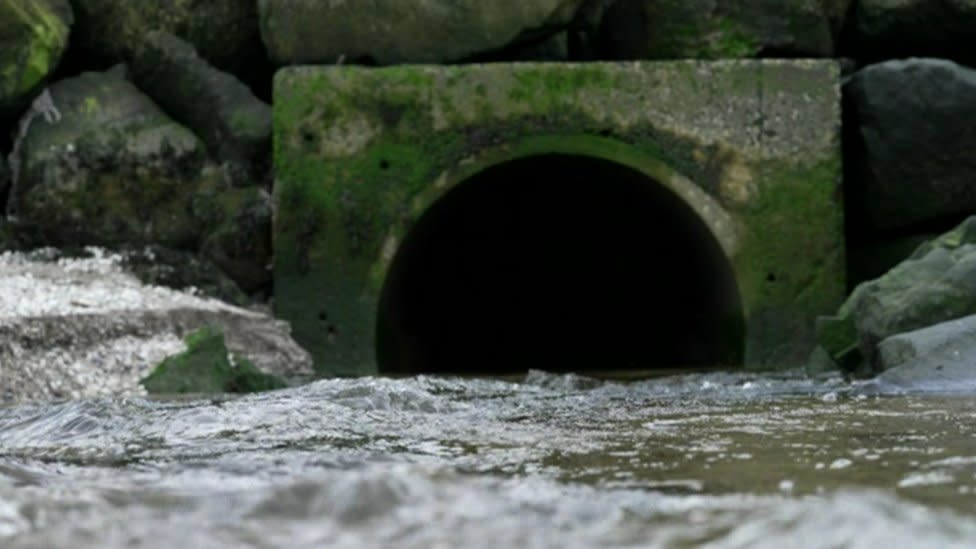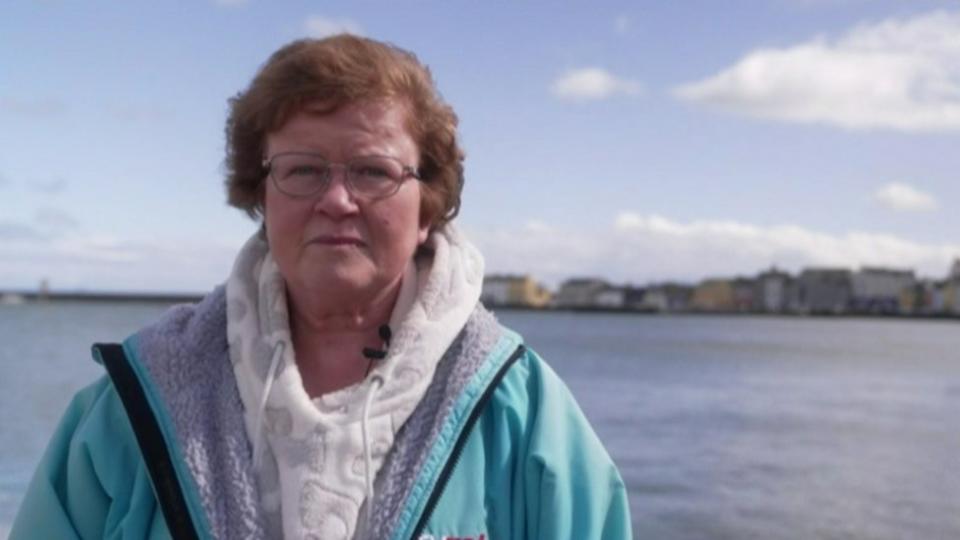Untreated sewage: Some 20m tonnes spilled every year

More than 20 million tonnes of untreated sewage and wastewater is being spilled into Northern Ireland's waterways annually, NI Water has said.
Untreated sewage includes human waste and chemical discharge from factories.
NI Water said this spills from storm overflow pipes more than 24,500 times each year into rivers, lakes and bathing waters.
It added the spills would continue unless it received more funding to improve the network.
In theory, one of Northern Ireland Water's 1,124 wastewater treatment works will treat any discharges coming from homes and businesses, before pumping the newly cleaned water back into rivers or the sea.
However, the company's internal estimates of untreated sewage spills tell a different story.
Modelling data revealed on 24,521 occasions each year, wastewater coming from toilets, washing machines and factories is going straight into the water without being treated.
That wastewater will contain trade effluent, oils and human waste.
NI Water is legally permitted to have some spills like this from sites called combined storm overflows, but only in exceptional circumstances like heavy rainfall.
"Combined storm overflows are a pressure relief valve for the wastewater network," NI Water's Director of Engineering and Sustainability Gary Curran explained.
"If we didn't have those, we would have out-of-sewer flooding, potentially damage to property and houses."

In practice, a majority of sites discharging wastewater are not compliant with environmental legislation.
A recent examination of half of NI Water's combined storm overflows found that 80% were in breach of legal limits.
It adds up to an estimated 20m tonnes of wastewater spilling into public waterways each year.
One NI Water facility, located near homes and a school in Clonoe in County Tyrone, is estimated to average a spill of raw sewage almost once a day.
Other spill sites are located near popular wild swimming spots and sensitive environmental areas.
Earlier this year the environmental regulator, the Northern Ireland Environment Agency (NIEA), informed NI Water in correspondence that it believes failings in its sewage infrastructure posed "a real risk to human health and the environment".
In a statement, NI Water told BBC News NI it agreed that "wastewater assets play an important role in protecting human health and the environment by improving the quality status of water bodies across Northern Ireland".
'We know we have a problem'
NI Water's sewage spills are not typically prosecuted as pollution incidents, owing to an agreement with the NIEA.
In 2007, the company was given guidance by the NIEA that it would not be prosecuted for some illegal sewage pollution in recognition of the historic underinvestment in the network.
An audit office report found that the company is responsible for one in eight pollution incidents in Northern Ireland.
Last week, the company was fined £250 and convicted of a pollution offence connected to wastewater treatment in Banbridge.
Mr Curran acknowledged the issue and said: "We know we have a problem.
"We've spent a lot of time with our models to try and detail exactly the extent of that problem and we know what we need to do to fix it."
However, those fixes will not be cheap.
Northern Ireland Water's business plan was agreed with the Utility Regulator in January 2020 and called for a £2.2bn in capital investment to address issues with the network.
Mr Curran said unless that money is made available, the spills and pollution incidents will not stop.
"That's very much now a departmental or an executive decision in terms of how much of that approved, regulated funding is allocated to us and we would certainly be putting a very strong case forward," he said.
"If the funding does not match our expectations, we will not be able to address all of the issues that we have."
Something in the water
About 5% of NI Water's storm overflows are raw sewage, Mr Curran said, with rainwater making up the remaining 95%.
"There is a small percentage, a very small percentage of what could be arriving on a beach is untreated sewage.
"In the vast majority of cases, those overflows will be so dilute that the water will be fine to go swimming in."
However some, like wild swimmer and anti-pollution campaigner Ruby Free, are not convinced.
"It makes you feel really unsafe when you don't know what you're entering when you're going into water," she said.

"As a water user - a regular dipper and surfer - I try my best to avoid getting in when I think it's going to be a load of heavy pollutants in the water, but the problem is I really don't know at the moment.
"Northern Ireland is the only jurisdiction in the whole of the UK and Ireland without real-time water quality reports, so that's something that we're trying to get more of over here.
"The frequency and volume of these predicted water spills highlights decades of underfunding, having catastrophic consequences to wider society and the natural world."
Ms Free and other campaigners met NI Water about the availability of water quality data a few weeks ago and she said greater transparency would be welcomed.
Bridie McElhill swims in Donaghadee harbour almost every day with her wild swimming group, the Donaghadee Chunky Dunkers. They have only one rule.
"No wetsuits. We have no problem with people using wetsuits, but they're not part of our group," she said.
Ms McElill said there is a storm pipe nearby which runs into the bay.
"When it is very, very wet weather, stormy weather, there is an increase in the outflow but in terms of the condition of the water, we generally find that it is OK to swim in," she said.

An estimated 45,000 tons of wastewater is spilled around Donaghadee each year, but the Chunky Dunkers are a hardy bunch.
"It doesn't really impact on us that much - the water is satisfactory. I think there must be very good turnover of water in the bay here," she said.
"We use our common sense. We know when the water is good and clear and then other times it would be a bit murky after a storm but overall we would tend to take a fairly pragmatic approach.
"If somebody doesn't want to go into the water, then that's their choice not to."

